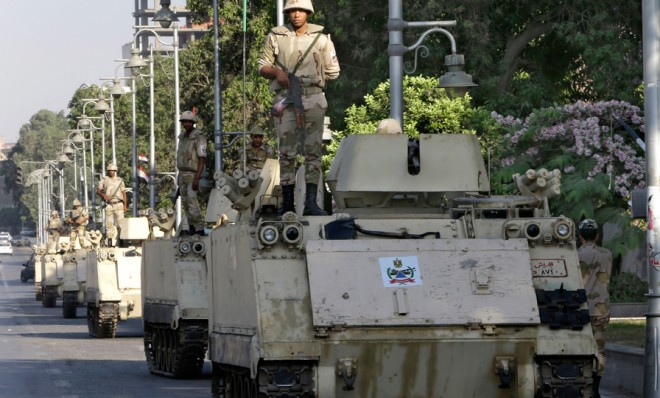Did Egypt's military manufacture an economic crisis to sabotage Morsi?
The fuel shortages and power blackouts that were dogging the country are suddenly gone. Why the sudden turnaround?


A free daily email with the biggest news stories of the day – and the best features from TheWeek.com
You are now subscribed
Your newsletter sign-up was successful
Egypt's political crisis remains tense, with Islamists protesting in the streets and vowing not to give up on returning the country's ousted president, Mohamed Morsi, to power. In many ways, however, life has gotten easier since the military swept Morsi aside and started arresting his allies in the Muslim Brotherhood. "Gas lines have disappeared," The New York Times reports, "power cuts have stopped, and the police have returned to the street."
Morsi's critics say the miraculous turnaround only proves how badly he was running the country. His Islamist allies, however, say the sudden easing of the energy crisis that had been hobbling the economy is evidence that the military and other powerful holdovers from the Hosni Mubarak era conspired to sabotage the country to pave the way for a coup. Did Morsi's enemies intentionally sabotage the economy to undermine his government?
"It is the police returning to the streets that offers the most blatant sign that the institutions once loyal to Mr. Mubarak held back while Mr. Morsi was in power," say Ben Hubbard and David D. Kirkpatrick in the Times. "Throughout his one-year tenure, Mr. Morsi struggled to appease the police, even alienating his own supporters rather than trying to overhaul the Interior Ministry. But as crime increased and traffic clogged roads — undermining not only the quality of life, but the economy — the police refused to deploy fully. Until now."
The Week
Escape your echo chamber. Get the facts behind the news, plus analysis from multiple perspectives.

Sign up for The Week's Free Newsletters
From our morning news briefing to a weekly Good News Newsletter, get the best of The Week delivered directly to your inbox.
From our morning news briefing to a weekly Good News Newsletter, get the best of The Week delivered directly to your inbox.
Other observers agree that the sudden return of police to the streets is suspicious. Still, there are simpler explanations for the sudden rebound. For one thing, the Times notes, oil-rich Saudi Arabia, the United Arab Emirates, and Kuwait — who had feared that Egypt's Islamist power boom would spread over their borders — pumped $12 billion in aid to Egypt after the army ousted Morsi. Doug Mataconis at Outside the Beltway adds that there are plenty of "other perfectly logical explanations for what may be happening."
Businesses tend not to be very productive when the political situation is unstable or when the political leadership is acting in a manner that seems to indicate that they don't know how to effectively lead the country. Once that regime is wiped away, it's not necessarily surprising that things would start turning around quickly. Additionally, for better or worse, the Egyptian military does seem to inspire in the people a sense of stability and order that is also conducive to the normal functioning of the economy and the rapid changes in the country since the coup could easily be attributable to an alleviation of the sense of uncertainty that had been gripping the country. [Outside the Beltway]
Many of Morsi's wealthy and powerful enemies wanted to get rid of him. Josh Voorhees at Slate notes that billionaire Naguib Sawiris boasted openly to the Times about the support he gave the "tamarod" or rebellion movement that precipitated Morsi's downfall. Resistance from Mubarak-era throwbacks probably contributed to the degeneration of the quality of life under Morsi, Voorhees says, but "the big question, of course, is the intentionally-or-not part of that observation."
Like pretty much everything that's going on in Egypt right now, it's tough to say with any certainty exactly what happened. The safest bet is probably a little bit from column A and a little bit from column B. [Slate]
So, yes, the military, the super wealthy, and bureaucrats left over from the old regime did what they could to resist Morsi, and by holding back they fed the impression that Morsi was a failure. But, as Max Read notes at Gawker, the movement to oust Morsi really did have mass support, and Morsi really "was by most accounts a difficult head of government, disinclined to compromise or to reach out to his political and ideological opponents."
There was (probably) never a "conspiracy," of the smoky-back-room variety, to undermine and remove Morsi — just capital, social and economic, and the widespread, deeply rooted bureaucracy of the Egyptian state, resisting a president it mistrusted, and a party it had always hated, in the only way it knew how. [Gawker]
A free daily email with the biggest news stories of the day – and the best features from TheWeek.com
Harold Maass is a contributing editor at The Week. He has been writing for The Week since the 2001 debut of the U.S. print edition and served as editor of TheWeek.com when it launched in 2008. Harold started his career as a newspaper reporter in South Florida and Haiti. He has previously worked for a variety of news outlets, including The Miami Herald, ABC News and Fox News, and for several years wrote a daily roundup of financial news for The Week and Yahoo Finance.
